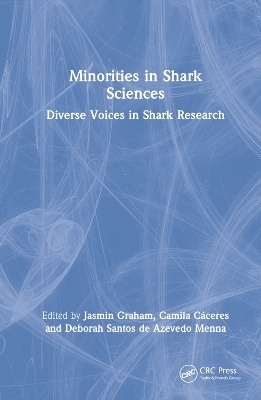
Minorities in Shark Sciences
CRC Press (Verlag)
978-1-032-19696-1 (ISBN)
- Titel z.Zt. nicht lieferbar
- Versandkostenfrei innerhalb Deutschlands
- Auch auf Rechnung
- Verfügbarkeit in der Filiale vor Ort prüfen
- Artikel merken
Minorities in Shark Sciences showcases the work done by Black, Indigenous and People of Color around the world in the fields of shark science and conservation. Edited by three minority researchers, it provides positive role models for the next generation. Highlighting new and important research done in the fields of biology, ecology, and evolution, the book places emphasis on scientists with diverse backgrounds and expertise from around the world. The heart of this book is that community and minority voices are important (and have always been) to science regardless of diplomas/universities/accolades/western standards of academia.
Despite the use of the term ‘Minorities’, most of the world’s population do not identify as white nor male, and in fact all "minorities" together comprise the global majority of humans. For those in these historically underserved and underrepresented demographics, it is meaningful to be highlighted and be given credit for their contributions. This book showcases to the world the many Black, Indigenous, People of Color, and LGTBQ+ scientists leading marine conservation, both in terms of scientific research and science communication.
It has been shown in the literature that diversity in scientists creates diversity in thought, which leads to innovation. Strong minority voices are exactly what is needed to bring greater attention to the conservation of sharks, and this book illustrates innovative science by people who were historically excluded from STEM. It highlights the unique perspectives these scientists bring to their field that allow them to interact with stakeholders, particularly in the areas of conservation and outreach.
As we continue to amplify these often-forgotten voices through research, outreach and engagement, we hope to stimulate innovation and transformative change in the field of shark conservation and marine science.
Jasmin Graham is a shark scientist and environmental educator who specializes in elasmobranch (shark and ray) ecology and evolution. Her research interests include smalltooth sawfish movement ecology and hammerhead shark phylogeny. She is a member of the American Elasmobranch Society and serves on their Equity and Diversity Committee. She has a passion for science education and making science more accessible to everyone. She is also the Project Coordinator for the Marine Science Laboratory Alliance Center of Excellence (MarSci-LACE) at Mote Marine Laboratory, which is focused on researching and promoting best practices to recruit, support, and retain minority students in marine science. She is also the President and CEO of Minorities in Shark Sciences (MISS) which is dedicated to supporting women of color in shark sciences. Her work encompasses the areas of science communication, social justice, outreach, education, and conservation. I care deeply about protecting endangered and vulnerable marine species, particularly elasmobranchs. I work in collaboration with Havenworth Coastal Conservation to study movements of elasmobranchs in Tampa and Sarasota Bay. Jasmin graduated from the College of Charleston in 2017 with a B.S. in Marine Biology and a B.A. in Spanish. She completed MSc. in Biological Science from Florida State University through the National Science Foundation's Graduate Research Fellowship Program. Camila Caceres is a marine biologist, shark scientist, and educator. She received a degree in Biology (BSc) from Duke University in 2012 and was first introduced to fisheries research when she was a research assistant at Stanford University’s Hopkins Marine Station. She then completed her masters and doctoral studies in the Heithaus Lab at Florida International University. Camila’s research focuses on coastal small-scale fishing and coral reef sharks and rays, in the Caribbean Sea. She has met with Colombia’s Vice-President to discuss marine research, has been featured in Discovery Channel, National Geographic, and Telemundo media among others, and was given the Professional Award at the academic conference Sharks International for her research. As an immigrant, Latina, and LGTBQ, she actively promotes diversity and inclusion in STEM and the outdoors. Deborah (Santos de Azevedo) Menna has a BSc in Biological Sciences with certificates in Geographic Information Systems and Environmental Science at Florida Atlantic University. During her undergraduate years, she participated in several research experiences, and trained to become an AAUS scientific diver. She completed a marine science externship with National Geographic Society & The Nature Conservancy. Menna is also a research assistant at American Shark Conservancy (ASC) based in Jupiter, Florida. With ASC she assisted in the study, post-release mortality rate of shore-based angling of Great Hammerhead sharks.She is also a project manager for ASC’s "Shark Surveys" project, which is a long-term monitoring program to investigate human-centered and environmental impacts of local shark populations. This is the first project in Florida to utilize any long-term evidence-based methodologies focusing on shark species’ diversity and populational vulnerability. In December 2021, she was named a National Geographic Young Explorer, the prestigious title only given to 25 audacious change makers around the globe. Menna is currently working at a respected firm as an Environmental Scientist, conducting surveys on protected species. Her goal is to use her experiences as a multicultural shark researcher and scientist to inspire a new generation of diverse marine biologists from under-resourced and marginalized communities that will champion conservation.
List of Contributors. Preface. Introduction. Chapter 1: Public Perceptions of Sharks. Chapter 2: Elasmobranch Ecology and Evolution. Chapter 3: Fields of Elasmobranch Anatomy and Physiology. Chapter 4: Shark Conservation and Fisheries Management Across the Globe. Conclusion. Additional Resources. Index
| Erscheinungsdatum | 25.10.2022 |
|---|---|
| Zusatzinfo | 12 Line drawings, color; 8 Line drawings, black and white; 28 Halftones, color; 40 Illustrations, color; 8 Illustrations, black and white |
| Verlagsort | London |
| Sprache | englisch |
| Maße | 156 x 234 mm |
| Gewicht | 660 g |
| Themenwelt | Naturwissenschaften ► Biologie ► Botanik |
| Naturwissenschaften ► Biologie ► Zoologie | |
| Weitere Fachgebiete ► Land- / Forstwirtschaft / Fischerei | |
| ISBN-10 | 1-032-19696-3 / 1032196963 |
| ISBN-13 | 978-1-032-19696-1 / 9781032196961 |
| Zustand | Neuware |
| Informationen gemäß Produktsicherheitsverordnung (GPSR) | |
| Haben Sie eine Frage zum Produkt? |
aus dem Bereich


